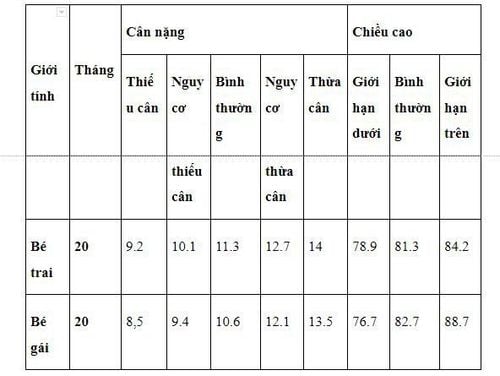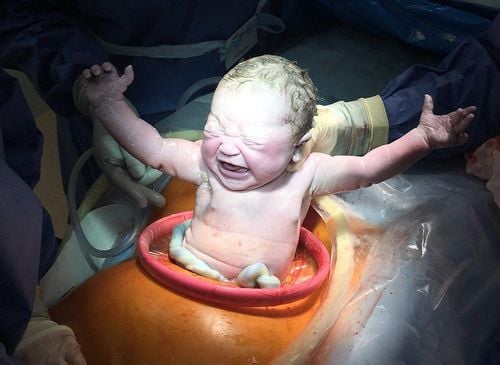This is an automatically translated article.
The article was professionally consulted by Doctor of Pediatrics - Neonatology - Vinmec Nha Trang International General Hospital.The right nutrition for each stage of the child's development is what parents are very concerned about. When a child is 20 months old, some skills will gradually improve and this time requires good nutrition and dental care.
1. What is the height and weight of a 20-month-old child in normal development?
The height and weight table based on the WHO 2007 growth standards and currently being applied to Vietnamese children this year will help parents somewhat assess the standard weight and height of their children. At the age of 20 months, children can't find the right solution as well as supplement nutrition for the child.
2. How does a 20-month-old child develop cognitively and emotionally?
In addition to the fact that children can walk, go up and down stairs, eat with a spoon, ... easily, grasp objects more firmly, children can draw because the ability to coordinate fingers has developed much more, Simple jigsaw puzzles are not a difficult challenge for children.
The 20-month-old's cognition is also developing strongly. Children are curious about everything around, know fear and show by nestling in their parents, however, parents can easily distract children's attention to other things very easily.
The 20-month-old's emotions and attitudes are also starting to become more diverse. Children can cry, roll on the floor, scream, bite, and wince to express their anger and dissatisfaction. However, this does not mean that parents "compromise" and give in to their children to avoid repeating those actions later.
20 months old baby can already say 15 to 30 words .

Nhận thức của trẻ 20 tháng tuổi cũng phát triển mạnh mẽ
3. Can a 20-month-old child eat rice?
Children 20 months old, parents need to feed children 3 main meals per day. At this stage, children can eat rice. But depending on the child, if the child is not yet able to chew or is not ready, you can gradually introduce the child to the child by giving them the first to eat crushed or mushy rice.
Each child's meal needs a combination of nutrients such as starch, fat, protein, vitamins, and minerals.
After 3 main meals, please give your baby about 50g of fruit or 100ml of dairy foods (such as yogurt, whey...). After eating, children can eat more yogurt to digest better.
In addition, give children 2-3 snacks, each meal is about 200 ml of milk. Occasionally, snacks can be replaced with other easy-to-eat foods such as vermicelli, noodles, tea... to diversify the child's diet and stimulate the taste buds. However, limit for children to eat snacks and drink sugary drinks. Absolutely do not force the child to eat more food, because this will scare the child.
However, for the best development, 20-month-old babies still need to breastfeed, 3 to 4 times a day, combined with 3 to 4 meals of porridge or rice.

Trẻ 20 tháng tuổi, cha mẹ cần cho trẻ ăn 3 bữa ăn chính mỗi ngày
4. Dental care for 20-month-old children
When preparing for teething, children often have more drooling, anorexia, fussiness, difficulty eating and sleeping well, always sucking their fingers, like biting solid objects, sometimes mild fever, red swollen gums in the area protruding teeth; diarrhea . Therefore, parents should pay attention to these characteristics in each stage of the baby's teething to take better care measures.
20-month-old children, in addition to having 4 incisors, 4 premolars, will grow 4 more canines. To take the best care of the child's teeth, parents should pay attention to the following:
If during the eruption of baby teeth, the mother can give the child fever-reducing medicine according to the doctor's instructions. However, parents need to distinguish between fever symptoms caused by teething babies or other reasons. Wipe the saliva or run around the baby's mouth with a soft cloth. Clean and clean the gums after feeding or after eating. Use a gauze or soft cloth, dipped in clean water, wrapped around the fingertips to gently wipe, wipe the gums and should give the child water to drink after feeding or solids. Give your child soft foods to make eating easier. Eating foods that are too hot or too cold for children is not beneficial for the development of children's teeth. In addition, it is also necessary to supplement children with calcium content in daily meals. For children who have grown many teeth, parents can guide children to practice brushing their teeth every day. Only a small amount of natural toothpaste for children should be used, instruct children to rinse their mouth out after brushing their teeth. Should buy toothpaste products for children. Parents play an extremely important role in nutrition and oral care for 20-month-old children. Hopefully, the article has helped parents understand more about the development of their 20-month-old baby as well as appropriate nutrition.

Trẻ 20 tháng tuổi cần được chăm sóc răng miệng chu đáo
In addition, parents should also apply some methods of changing habits and improving nutrition to support the child's teeth to develop better.
Besides, parents also need to supplement their children with essential micro-minerals such as zinc, lysine, chromium, selenium, vitamin B1, ... to fully meet the nutritional needs of children. The addition of these essential vitamins also supports digestion, enhances nutrient absorption, improves anorexia, and helps children eat well. Parents can simultaneously apply dietary supplements and functional foods derived from nature for easy absorption. The most important thing is that improving your baby's symptoms often takes a long time. Combining many types of functional foods at the same time or changing many types in a short time can make the baby's digestive system unable to adapt and completely not good. Therefore, parents must be really patient with their children and regularly visit the website vimec.com to update useful baby care information.













